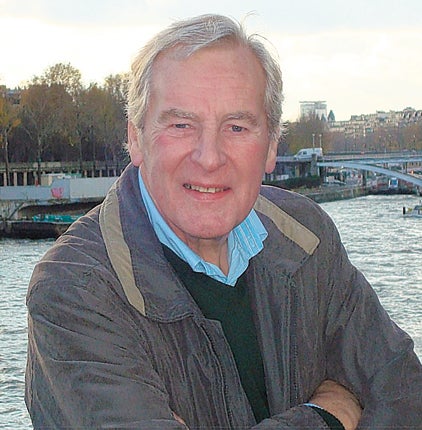Craig Thomas: Author of Cold War spy stories and inventor of the techno-thriller

Craig Thomas wrote 18 novels, six of which were bestsellers. But the book that brought him global fame was Firefox, after it was adapted for a Hollywood film directed by and starring Clint Eastwood. The blockbuster sold so well that its author was able to give up teaching in 1978 and live as a full-time writer.
Both book and film have as their main character a US fighter-pilot named Mitchell Gant, who steals a Soviet MiG-31 with spectacular consequences. Meticulously researched and featuring cutting-edge technology, like all of Thomas's books, the novel spins a gripping yarn that draws the reader into a world of chilling Cold War espionage. It was the first techno-thriller and the first action story to be set mainly in the Soviet Union.
The hero-spy appeared in several more of Thomas's novels and established their author as a leading exponent of the genre, on a par with, though perhaps not quite as famous as, his fellow countryman Ken Follett. In A Different War, Gant appears as an air accident investigator in the corrupt world of global aircraft manufacturing during the 1990s. The novel is set at the end of the Cold War and reflects on the demise of the old political and moral certainties.
Craig Thomas was born and brought up in Cardiff and educated at the city's High School and University College, where he read English. His father was the legendary rugby journalist JBG Thomas, from whom he inherited a delight in vivid language. After graduating in 1967 he wrote an MA dissertation on Thomas Hardy and then taught English at various schools in the West Midlands, including the Shire Oak School in Walsall Wood and King Edward VI School in Lichfield. He ended his career as head of department.
Having made an unsuccessful start as a scriptwriter for radio, he soon turned to writing novels, beginning with The Rat Trap (1976). His wife, Jill, acted as his amanuensis and editor of all his books. "He had a great passion for his writing and for music," she has said. "Even when he was in hospital undergoing chemotherapy, he was still scribbling away until it just got too much for him." The couple moved from Lichfield to Somerset in 2010. He died after a short battle with acute myeloid leukaemia.
The violon d'Ingres in which Thomas found deep satisfaction was his writing about philosophical subjects. His volume of essays, There to Here: Ideas of Political Society, appeared in 1991 and he finished a two-volume commentary on the writings of the German philosopher Friedrich Nietzsche shortly before his death. He regarded philosophy as "the greatest adventure of all".
But his life's work was as a master storyteller. His other books in the spy genre include his fourth novel, Snow Falcon (1980), which was favourably reviewed by none less than C P Snow, together with Sea Leopard, Jade Tiger and Firefox Down, all of which made him an international bestseller; the last-named was dedicated to Clint Eastwood. His books have sold more than two million copies. He also wrote, as David Grant, Moscow 5000 (1979) and Emerald Decision (1980).
Asked why he was drawn to the thriller, Thomas said, "Because of its evident sense of tension and danger, the deliberate structure of the plots, and perhaps the emphatic moral framework, just as many writers of detective fiction are drawn to the sense of justice their books demonstrate towards good and evil. There is an attraction in the thriller or adventure story, for both the writer and the reader, in knowing which side one is supposed to be on. And thrillers are optimistic. Their problems are soluble and they are resolved by individuals. As Oscar Wilde said, 'The good end happily, the bad unhappily.' That is the meaning of fiction." Few writers have provided such a succinct and lucid guide to their work.
Most of his novels in his favourite mode are set within MI6 and have Sir Kenneth Aubrey and Patrick Hyde as their main protagonists. Although the invention of the techno-thriller is sometimes attributed to Tom Clancy, aficionados of the genre believe Craig Thomas to have been its true originator. "Plotted to absolute perfection," was the observation made by Peter Finch, chief executive of Literature Wales, on hearing of the writer's death.
In Snow Falcon, Thomas speculated on a possible Soviet invasion of western Europe via Finland. He found his own voice in writing out of this preoccupation with geopolitical problems and conflicts. He believed that the kind of books he wrote had not been consigned to history by the fall of the Berlin Wall. "Just watching the evening news or picking up a newspaper ought to make it obvious that the world may now be a more, rather than a less dangerous place," he said.
A formal man, courteous and amiable, Craig Thomas took a lenient view of humankind but did not flinch from recording some of the atrocities of which we are capable.
Meic Stephens
David Craig Owen Thomas, teacher and novelist: born Cardiff 24 November 1942; married Jill Whittington; died Bath, Somerset 4 April 2011.
Join our commenting forum
Join thought-provoking conversations, follow other Independent readers and see their replies
Comments
Bookmark popover
Removed from bookmarks